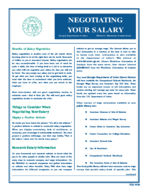NEGOTIATING
YOUR SALARY
Georgia Department of Labor
Michael L. Thurmond, Commissioner
Benefits of Salary Negotiation
Salary negotiation is another area of the job search where knowing what to do at the right time can be worth thousands of dollars to you in increased income. Salary negotiation can be very uncomfortable. If you have been out of work for quite a while, the idea of being back in a job is so attractive you often will not negotiate your salary for fear you will not be hired. You may accept any salary just to get back to work. To get what you have coming at the negotiating table, you must take the time to understand what you have achieved, what you have to offer, and what you are worth to the employer.
Most interviewers will use good negotiation tactics to minimize costs - that is their job. You will need good salary negotiation tactics to maximize the offer.
Things to Consider When Negotiating Your Salary
Display a Positive Attitude
No doubt you have heard the phrase: "It's all in the attitude." A positive attitude is critical to successful salary negotiation. When you display uncertainty, lack of confidence, or insecurity, your advantage is substantially weakened. You must project a positive self-image, one that says boldly, "This is the salary I want, and I'm worth every penny."
Research Salary Information
Do your homework and research salaries to know what the pay is for other people in similar jobs. Here are some of the many ways to research company and wage information: Use the Internet to research companies and gather information on salaries and other benefits. Many Web sites have wage information for different companies so you can compare
salaries to get an average wage. The Internet allows you to find information in a fraction of the time it used to take to locate such data. Information is also available at the Department of Labor's Web address at www.dol.state.ga.us. Choose Workforce Information & Analysis from the main menu, then choose Internet QuickStats! from the Workforce Information & Analysis menu.
Your local Georgia Department of Labor Career Centers will have available the Occupational Outlook Handbook, the Georgia Wage Survey, and America's Top 300 Jobs. These books are an important source of job information and contain starting and average pay rates for many jobs. These books are updated every two years based on information from the U.S. Department of Labor.
Other sources of wage information available at your public library are:
q American Almanac of Jobs & Salaries
q American Salaries and Wages Survey
q Career Guide to America's Top Industries
q Career Connection for College Education
q America's Federal Jobs
q Dun & Bradstreet
q Occupational Outlook Handbook
q The American Book of Jobs & Salaries Your local public library will also have resources such as wage surveys that provide salary levels of specific jobs. This
continued
DOL-4434
information will give you a benchmark to begin salary negotiation. These surveys are undertaken by professional organizations, associations, industry trade magazines, and other data collecting organizations. Some of these resources include:
q The Georgia Wage Survey
q The Almanac of Georgia Salaries
q The American Salary & Wage Survey
Consider Timing
Timing is everything. Try your best to avoid mentioning salary until you receive a firm job offer. This will give you more time to gather information about the job and sell your skills to the employer.
Effectively postponing salary negotiation has several advantages. You:
q May get a better salary offer than you originally planned.
q May refrain from "shooting yourself in the foot" by asking for too low a figure or from ending the negotiation by asking for too high a figure.
q May be able to gauge how the interviewer is evaluating you.
q May discover the starting point of the negotiation process.
Be Flexible: Keep Your Options Open
Many times the interviewer will mention salary as if it were pre-determined and non-negotiable. Do not agree or disagree. Simply state, "This figure fits perfectly into my range." This open-ended statement will allow you to continue the interview with all your salary options open.
Never Negotiate Salary Over the Telephone
Negotiating over the telephone puts you at a disadvantage. You cannot judge the actions of the interviewer, so you're less likely to get the salary you're worth. Wait until you have a firm job offer, then arrange for an in-person interview to discuss salary.
Be Prepared
Practice your negotiation skills with family and friends before your interview. Go into your interview with your research done and your negotiation skills polished.
Remember that salary negotiation is not about win/ lose. It is a two-way process where you and your prospective employer are each trying to get something both parties need.
Being prepared to negotiate your salary will enable you to obtain the best possible income for you and your family.
Visit our website at www.dol.state.ga.us
Equal Opportunity Employer/Program l Auxiliary Aids & Services Are Available Upon Request To Individuals With Disabilities
